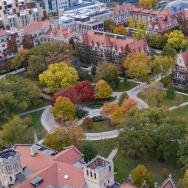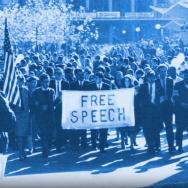In 2014, in response to a wave of schools and universities disinviting speakers for their unpopular views, the University of Chicago created a faculty committee to articulate the University’s “overarching commitment to free, robust, and uninhibited debate and deliberation among all members of the University’s community.”
The committee’s report the following year asserted that “debate or deliberation may not be suppressed because the ideas put forth are thought by some or even by most members of the University community to be offensive, unwise, immoral or wrong-headed.”
Now known as the Chicago Principles, the report was praised by institutions and free expression advocates—and has since been adopted by more than 110 colleges and universities seeking to uphold free inquiry and expression. But it also been criticized, especially as the landscape of higher education continues to evolve in the 10 years since it was released.
On Jan. 31, the University of Chicago and the Forum for Free Inquiry and Expression will hold an event at the Rubenstein Forum to discuss the past, present and future of the Chicago Principles—and to examine topics involving free expression at UChicago and campuses across the country. It is among a series of events at UChicago this year exploring free expression to mark the Chicago Principles’ 10th anniversary.
“The ideas and values that comprise the Chicago Principles emerged in the University’s earliest days and have been tested over a long period, before being written in codified form during a period of crisis around free expression on campuses nationally,” said President Paul Alivisatos. “That they have become so widely celebrated is a true testament to their relevance. The Chicago Principles are an enduring bedrock for truth-seeking institutions of higher education.”
The event will begin at 10 a.m. with a welcome from Provost Katherine Baicker and keynote address from Alivisatos. At 10:30 a.m., five members of the original Committee on Freedom of Expression will discuss the Chicago Principles, 10 years later. Prof. Tom Ginsburg, faculty director of the Chicago Forum, will moderate a discussion with UChicago Profs. Marianne Bertrand, Geoffrey Stone, Kenneth Warren, Amanda Woodward and Columbia University Provost Angela Olinto.
At noon, Prof. Nick Feamster will join Zeynep Tufekci, a New York Times columnist and professor at Princeton University, to discuss free expression and emerging technologies. At 1 p.m. UChicago faculty will examine contemporary challenges and the future of free expression. Prof. Ethan Bueno de Mesquita, dean of the Harris School of Public Policy, will moderate a faculty panel including UChicago Profs. Adam Green, David Keith, Rochona Majumdar and Deborah L. Nelson, dean of the Division of the Humanities.
“The Committee on Freedom of Expression’s report was an important articulation of the University’s tradition and values—and became a touchstone for other colleges and universities,” said Ginsburg, the Leo Spitz Professor of International Law. “Ten years later, it’s an important time to re-examine the role of the Chicago Principles, as we and others continue to wrestle with free expression.”

